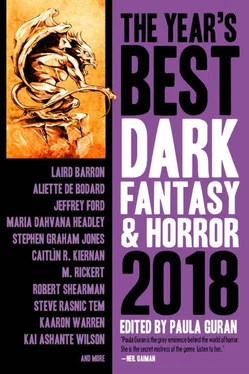On Highway 18
Rebecca Campbell
Jen bought a 1982 Plymouth Horizon for four hundred dollars just before they graduated high school, so if she and Petra wanted to get into town for the Bino’s—open twenty-four hours—to eat fries and pale, oily gravy, or drink the bitter black coffee of three a.m., it was Jen who drove. Petra rode shotgun, watching the highway unfold, and refold, and unfold again as it wound through clear-cuts. Sometimes they had a place to be, a pit party, or a dozen people meeting up at a doughnut shop on the highway. A lot of the time, though, it was just the two of them, driving four hours to an empty beach on the Pacific coast of the island, arriving in darkness so absolute they couldn’t see the waves, only hear their roar at low tide, sitting under the starless, overcast sky until the sun rose.
Mostly they took Highway 18 into town, running from the island’s coastal valley to its interior mountains. Everyone else did, too, as though at one end or the other something might happen, and if you missed it you would miss the only thing that had ever happened or would ever happen on the island.
Anyway, after Jen bought the Plymouth they often found themselves in town, driving through well-lit and desolate streets to the 7-Eleven, where they would buy Orange Crush and gummy sours. Their only company a few kids squatting in the parking lot under lights that turned their acne scars purple and glazed the concrete a brassy gold, all these kids with blue freezie-stained mouths.
Petra often thought about Highway 18, and about how it spilled from the empty stretches, unlit, into the parking lot, the kids, the Bino’s. While Jen chatted with another long-haired boy, Petra walked through the cars to the highway and watched the trucks full of logs so enormous it was hard to believe they grew that way as they barreled through town like it wasn’t a place, just an interruption on the long peregrinations lumber takes from hillsides to sawmills and freighters and then out across the Pacific.
The kids in the 7-Eleven parking lot knew everything that happened from one end of the highway to the other. They knew, for example, about the last girl who’d been found—the one in the ditch beside the Petro-Can.
“Be careful, man,” he said, a kid Petra had known in tenth grade, “you know how ghosts like highways. Watch out for hitchhikers.”
“Ghostly hitchhikers?” she asked, watching Jen and her Jesus-haired boy.
“Yeah, man! They’re all over. I talked to a truck driver and he told me about this girl he picked up north of Port Alice, and she told him shit. I won’t even fucking repeat it. She told him what’s going to go down in like the year 2000. And when they got to the bus station in Nanaimo, he pulled over and she was gone. Like bam. Gone.”
“Have you ever seen her?”
“Maybe? Like. I thought I did once, but I didn’t pick her up. But if I get a chance again, I’ll pick her up and ask her all sorts of shit about what’s coming.”
After she talked to the kid in the parking lot, Petra began to watch for hitchhikers. She knew the types: northbound tree-planters; a man and his toddler Petra saw on Monday mornings; guys on their way in to work or back home again. There were kids from the university headed for the beaches on the west coast.
It wasn’t until a few weeks after the 7-Eleven parking lot that she began to see—or think she saw—the other sort of hitchhiker. The first time, it was just a thin girl in ten o’clock summer twilight or the very early morning. This kind might only appear as a silhouette, a girl who disappeared as one glanced down to adjust the radio.
But then Petra saw her on a long straight, when they were driving behind a truck. She knew that in the cab of the truck, a man—she was sure, always, that it was a man—had seen the girl as well.
The truck stopped. As they passed, the girl had reached the passenger door and was illuminated by the interior light, and though Petra looked back to see her face, she saw only her dark hair and the driver’s silhouette in the cab. The sight was so familiar, Petra wondered if it happened every time they drove that road, every time they saw a girl stick out her thumb to get a little further down the highway.
Her mouth was dry when she finally asked Jen, “Does it feel weird, to you?”
“What’s weird?”
“That girl back there.”
“It’s not weird, it’s stupid . Remember what happened to Nicki?”
And then the thin whine of stretched magnetic tape interrupted Jen as she was about to mention, say, the girl they found in the ditch by the Petro-Can, and talk about how they should all know better.
Of course Petra hitchhiked, too, everyone did, even if they never talked about it. The bus only ran twice daily. You didn’t have a car. It was different on an island anyway, you all knew each other, though she was rarely picked up by anyone she knew, which meant her parents didn’t have to hear about it. Things happen, of course, but when don’t they? Girls are lost, then they’re found again, and that’s often worse than thinking they’ve disappeared somewhere, into the city maybe.
The last time she hitchhiked was at the end of a long day on the river in the July before she left town for university. She was supposed to get a ride with someone’s cousin, but they wanted to stay so Petra started walking back to town. She still had fifteen km to go—and was at least ten from a payphone—when she decided to push her ratty, river-tangled hair behind her ears and stick her thumb out into the empty road.
A huge beige car emerged from one of the driveways in the subdivision past which she walked, just right there, like he’d been watching for her.
He unlocked the door and she asked, “Where are you headed?”
“Just returning some tapes to the video place on Festubert, that good enough?”
They chatted about one of the tapes he’d rented. The Thing. There was one part with a defibrillator, where the man’s chest opened up and the doctor shoved his hands right up inside the body. But that monster—it bit his hands off and swallowed them and then turned into something new and then something else new. He laughed. He said it again, about the doctor’s hands plunged inside the man up to his wrists and bitten right off .
Then, halfway into town he asked, “Are you working?” And Petra said no, she was going away to school in September, so she wasn’t even sure if it was worth looking, though last summer she’d got a job at an ice cream place. That had been okay.
“Oh.” He sounded disappointed. “I was looking for a girl.”
“Yeah,” Petra said. “Ha-ha.”
Ten minutes later, they pulled into the parking lot of the Video Pantry. She picked up his three VHS tapes and reached for the door. It locked under her hand.
She pulled on the handle.
“You want to go have coffee?”
“No, no thanks. Ha-ha,” she said.
“Too bad.”
She pulled on the handle again.
“I have to get home. Ha-ha. My dad—”
She pulled on the handle. She didn’t see him move, but this time the door opened. She returned The Thing and the other tapes, then waved over her shoulder and fled along the sidewalk of the strip mall hoping she would not look up to see the beige Reliant and the man watching her. As she walked the rest of the way home, she thought not of the instant the door clicked shut, even though it was a sunny Saturday afternoon, and even though she was in a parking lot full of minivans and children.
She fixed him in her mind: the man with the scaly red skin along his white hairline, the heavy ring on his left pinky, the tuft of white hair poking through the placket of his golf shirt. His khaki slacks. The pine-scented beige-velvet interior of his car. The doors that lock and unlock and lock again.
Читать дальше












